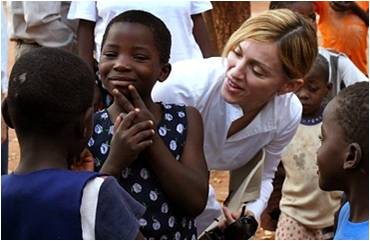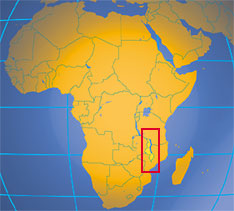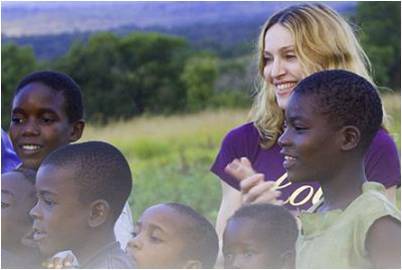
With Dr. Jane Aronson, "The Orphan Doctor"
We cannot fully understand the specific circumstances of little Mercy in Malawi, the three-year-old girl Madonna wants to adopt -- can her grandmother care for her, for example -- and we agree that "adoption is not the answer."
But, with 145 million orphaned and abandoned children in the world according to UNICEF, there should be at least one -- maybe in Malawi -- who would benefit by being adopted by an American. Or a German. Or even a Japanese. Maybe even a doctor or lawyer in Malawi itself.
Madonna has been accused of slinging her new baby on her hips the way another woman might choose a new handbag, but when Madonna is asked why she chose Malawi, she answers candidly, "I didn't, Malawi chose me."
"Madonna is supporting the lives of countless other orphans and vulnerable children throughout Malawi. That fact often gets overlooked," adds Philippe Van Denbossche, executive director of Raising Malawi.
The two of us writing this article know about orphans and have witnessed orphan care in the developing world. We are both committed to local family care if possible. But let's be real here: It is not always possible. Adoption is not the solution for the world's needy orphans, but neither is it a bad thing.
Jane Aronson is a pediatrician who helps orphaned children through her organization, Worldwide Orphans Foundation. She strongly believes a child is never better off in an orphanage. Depression, developmental delays, and attachment disorder in orphaned children is a tragedy and a loss of human capital.
Let me tell you about an orphanage I visited in the developing world. Thank God it is one of the worst, but you tell me if you think intervention could help. I found my own son in conditions not much better. He is in New York City now, playing with his friends.
We walked down the muddy path, the steps cut into the dirt ran with water. They were covered in garbage, making them quite slippery. The house sat on a forty-foot ledge on the mountainside, with a tiny dirt yard surrounding it.
Two girls dressed in rags sat in the dirt, cutting up a chicken on the ground. They stared at us blankly as we walked by and said hello to them.
The staff greeted us. They were old and tired, and seemed quite bitter. They welcomed us into the home, which had a porch wrapped around a central room. The porch was dark, dank, and full of rusty bunk beds with no mattresses.
The staff explained that the children wet the beds so frequently that the mattresses had rotted away. Or perhaps they had removed them. Now the urine from the children on the upper bunks could simply fall onto the children in the lower bunks.
Generally these sorry institutions prepare well in advance when they expect visits such as ours, so we can never really see the real human devastation that festers in these orphanages.
With no ventilation, the odor of human waste mingled with sweat, as everything simmered in the tropical heat. I began to gag, and I had to leave for air outside. Forty children lived there, they informed us, and could we fund them?
I felt these women were not capable of using wisely any funding they might receive. The children needed to be removed immediately. All of them looked extremely lethargic and sick from malnutrition and abominable conditions.
We asked if the children chopping the chicken on the dirt yard were preparing lunch and were told that they could not afford lunch, and that the single chicken was meant to feed the forty children at dinner. We parted, sickened and unable to help.
How could children like these be helped? The number of children adopted into the U.S. from other countries, less than 20,000 per year, is miniscule. Less than 0.02% of the world's orphans are placed through international adoptions. The number or percentage is unlikely to increase and, in fact, has been recently decreasing, while HIV/AIDS is increasing the numbers of children without parental care.
International adoptions, then, are an option, but obviously not a complete solution. Orphans International Worldwide believes that family care -- in the child's community -- is best.
Adoption is an option, but obviously not the solution. There are many good models for community building that could eventually strengthen families and prevent child abandonment. These models are being implemented by NGOs and government partnerships in the developing world, but not fast enough to save the bodies or spirits of the 145 million orphans around the world.
Since 2006, Madonna has actively funded The Mphandula Childcare Center. It was built by Madonna's charity, Raising Malawi, and it provides primary schooling and other child care to about 4,000 children. The charity also works on the ground with local partners, facilitating funding grants and hands on medical and structural support.
But raising 0.02% of orphaned children as global citizens in Europe and North America is certainly not cultural genocide -- and in reality makes the world a more interesting place to live.
Madonna has raised the profile of this landlocked country in the southern sub-Saharan peninsula of Africa, through the adoption of David Banda in a way no other NGO or charity could ever dream to achieve.
All children deserve to benefit from such ideal solutions, to have basic human rights. "I have worked my whole life with children in rural Malawi," my friend Solomon Nkhalamba told me yesterday. "Sadly, neither my nation nor Save the Children can help them all."
 Why criticize Madonna for saving one or two children?
Why criticize Madonna for saving one or two children?
Meanwhile, raising a small percentage of orphaned children as global citizens in Europe, North America, and other host countries is certainly not cultural genocide, and, in reality, makes the world a more interesting place to live. So, why criticize Madonna for saving one, or two, children?
Do we commit children to Hell in its own countries in the name of political correctness? No. In fact, we could likely feed, clothe, and educate many thousands more of the world's orphans. Money that was spent to send journalists to Africa when David was adopted by Madonna could have supported many effective community programs for orphaned children in Malawi.
Jane and I love our adopted children more than anything else in the world. We would both rather have them raised by Madonna than grow up where we found them.
 Landlocked Malawi is on the Eastern coast of Africa.
Landlocked Malawi is on the Eastern coast of Africa.
Edited by Farah Dan and Karen Davis.

